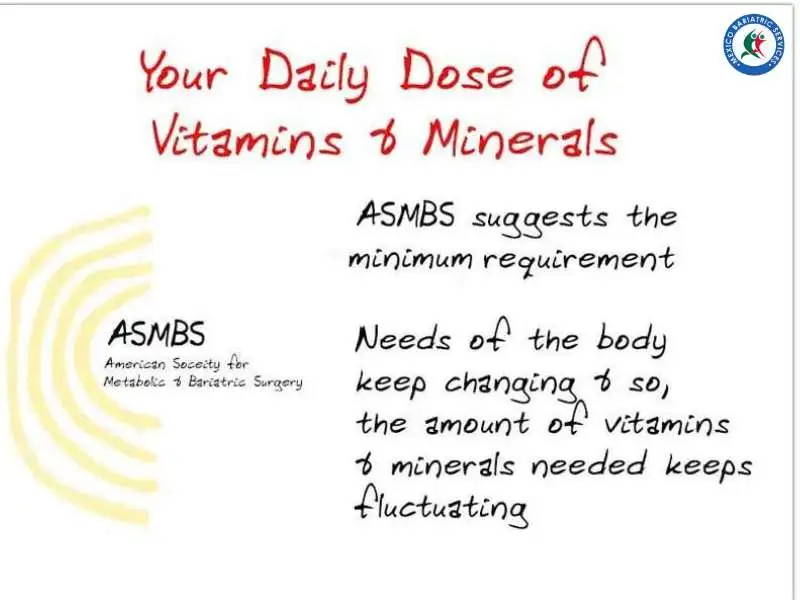Guidelines for Post Bariatric Surgery Vitamins and Supplements Intake
Medically Reviewed by Katelyn J. Mock, US-Registered Dietician (R.D.)
Bariatric surgery permanently alters your lifestyle. This means that you will have to take lifelong vitamin and mineral supplementation. A stricter routine for post bariatric surgery vitamins and supplements will have to be followed in case you opt for Duodenal Switch or Roux-en-Y Gastric Bypass.
Look out for signs and symptoms of malnutrition after gastric bypass and keep a tab on your health.


Our Bariatric Nutritionist says: Think of vitamins/minerals as life-long medications. Each year, get your labs checked to make sure everything is in the right range. Everyone is different, and two people who take the same supplements can have utterly different lab results. At certain points in your life, you may need to invest more or less of some vitamins and minerals.
Recommendations for Post Bariatric Surgery Vitamins and Supplements
Thiamin, B12, Folate, Iron, Calcium, Vitamin D, Vitamin A, Vitamin K, Vitamin E, Copper, and Zinc are recommended post-bariatric surgery vitamins and supplements after weight loss surgery. Your PHP and doctor can advise you on the dosage according to your labs.
Here is a table for the post-bariatric nutrient requirements.
Have you had your iron checked recently, and it was low?
Try taking a bariatric multivitamin that contains iron or a separate iron supplement with 1/4 of orange juice diluted in 1/4-1/2 cup water.
Vitamin C may help your body absorb the iron in the vitamins by converting it into a form that is more readily available in your body.
Bariatric Patients Have Individual Nutritional Requirements
The ‘American Society for Metabolic and Bariatric Surgery.’ recommends post bariatric surgery vitamins and supplements based on what they find through research.
- It’s not going to meet everyone’s needs 100%. Someone who is 5’10” male and weighs 240 pounds might need one thing. Someone who is a male, 6’01” and 240 pounds might need something else.
- The same way that we are all different shapes, colors, sizes; it’s the same with our vitamins and nutrient needs.
- We are given estimated guesses as to what meets the needs of most people and then as time goes on, we adjust that to meet your specific needs.
So, it is essential to get regular vitamin and mineral checks to work with your physician and your nurse practitioner wherever you live. Also, get those labs done so that your nutritional levels are determined, and to adjust the dosage from there.
Nutritionist Tip – To Patch or Not to PatchVery few vitamins can be absorbed through the skin in the amounts needed by the body for anyone, and especially after undergoing weight loss surgery. Maybe someday technology will get this far, but right now the studies show that the patch does not show enough absorption. |
Finding the Right Post-Bariatric Surgery Vitamins and Supplements
As time goes on and you get your labs done, you’ll find that you may have different requirements for some nutrients compared to others. It may be frustrating in the beginning to find the right supplement, but with the help of your nutritionist, you could find one that suits you.
Post Bariatric Vitamin & Minerals
- Some people can do a capsule from day 1 post-op and have no issues whatsoever.
- Other people can do a capsule until they are two months, six months, or a year after surgery. They need the chewables and the liquid.
- And sometimes, what you tolerate might not meet 100% of your needs…so you might need to take two doses of something as opposed to just one treatment as it is on the label.
- You might need to take one dose of this product and maybe another dose of a different product to meet your needs.
And so, as time goes on, you might use one product now, and six months from now, you might discover that it is not meeting your needs…you feel like you need something else, or you are sick of liquid or the flavor of the chewable, and you want to try a different product. It is one of those things that will kind of ebb and flow as time goes on.

Importance of Iron Post-Weight Loss Surgery
Iron supplementation after bariatric surgery is always necessary. It is a very important mineral, and you should make sure you’re taking it, especially if you have had issues with low iron in the past.
Some things to remember:
- Always take it with enough fluids since we can’t gulp liquids anymore.
- You want to make sure that you’re sitting down and taking the time for some small sips every 30 seconds or so to make sure that the iron supplement goes down to your new pouch okay.
- Take it in the form of food or liquid that contains vitamin C. If you are early post-op, you’re not going to want to take it with food, but maybe having it with some diluted orange juice can work. Vitamin C helps the body to absorb the iron.
- You could eat a few strawberries with it, clementines, or a couple of orange slices.
How to Avoid Constipation Caused by Iron after Weight Loss Surgery
Constipation after bariatric surgery can be another big issue for people.
- Make sure you can get enough fiber from fresh fruits, fresh vegetables, and whole grains.
- You could even take a fiber supplement because iron can be very constipating for some individuals.
So, if you have had any issues with iron, go ahead and post it in the comment section below. If you have some tips for how you got over your problems with iron supplements, we would love to hear from you as well and pass on such knowledge to other people.
This Post Addresses
- Vitamins after bariatric surgery
- Bariatric multivitamins
- Vitamins for gastric bypass
- Post-bariatric surgery vitamins
- Weight loss surgery vitamins
- Vitamins for gastric bypass patients
- Gastric sleeve patients vitamins list


